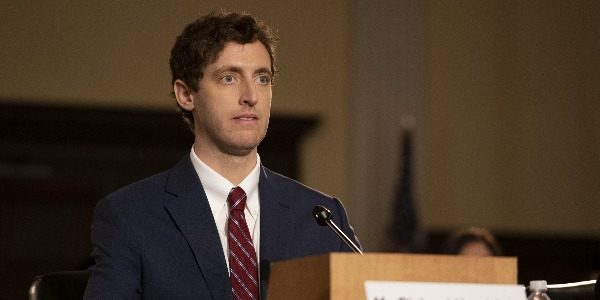SILICON VALLEY Season 6: A Bittersweet Ending That Encapsulates The Show’s Core Theme
Reyzando Nawara is a passionate film and TV enthusiast from…
Five years ago, Silicon Valley began its journey as an offbeat comedy that depicts the rise and fall of building a startup, offering plenty of hilarious moments while at the same time displaying how hard it is to navigate the tech world. But then as years passed by and the real Silicon Valley itself keeps evolving, the show started to morph into something more relevant: a satirical look into the ever-growing world of tech business. The sixth and final season that came two months ago, continued this trend by giving us a brilliant examination into morality, questioning whether money and power can co-exist with ethics or not. Even so, one of the greatest strengths that is always admirable about the show is, even when it tries to tackle weighty issues regarding tech business, it always finds ways to deliver it in an enjoyable and digestible fashion.
There were no bad episodes. Not even one. Even when it starts losing some steam because of the hamster wheel formula that keeps repeating each season, the show’s creators — Mike Judge, John Altschuler, Dave Krinsky — and writers, know exactly how to lift every single moment into its original best self. While the show’s sardonic humour remains front and centre until the series finale that aired on December 8, season six manages to break a new ground by tapping even deeper into the dysfunction of tech culture, examining how compromising one’s morality and ethics has always been inherent in any path to success.
Examining Morality and Ethics
When season five ended more than a year ago, we saw Richard Hendricks, the CEO of Pied Piper, and his misfits programmers finally gain a sense of success and control over his own company after a series of ups and a lot of downs. They were ready to finally build what they set out to do, a new internet that helped to create a better world. Almost all the money that they needed was already on their deck, fancy new office building was also prepared by their longest ally Monica, and everything was just going exactly as they’ve always dreamt of. In fact, when we see them in the season six premiere, Richard is about to snatch one more victory as he’s testifying before a congressional hearing on data privacy and how his company wants to create a tech culture that is far healthier than it is now.
Not only does Richard confidently plead that Pied Piper does not mine private data on its users, he also delivers a passionate speech about the importance of building a more democratic internet as if he throws a middle finger to Facebook, Google, and Amazon. “I promise you,” he said, specifying on the way said companies have been taking advantages of their users, “I will help you end this tyranny by building an internet that is of the people, for the people, and by the people. So help me God.” But of course we know better than anybody, the show will pull the rug from under us and tells us otherwise. Yes, the promise that Richard made under the name of law backfires the minute he realises that one of his developers Colin (Neil Casey), has been amassing plenty amounts of private data on PiperNet, Pied Piper’s new network that does not decentralise its users’ data and instead allows them to control it on their own terms.

Having no time to let the shock overwhelm him, Richard instantly tells Colin to stop it, though knowing how much of a jerk Colin is, it’s obvious that Richard’s attempt is futile. This certainly puts Richard in a very precarious position. If he intends to stay true to his promise, it means that he has to fire Colin. Meanwhile, firing Colin means that PiperNet will lose most of its users, which is basically the last thing that Pied Piper could afford to have at the moment. The dilemma, however, does not stop there. As Richard tries to collect more funding, he must decide whether to accept a billion dollars from a Chilean investor who has direct ties to Chile’s military dictatorship and wants him to collect more user data like what Colin’s already done. Worse, in the show’s series finale, Richard is facing an ultimate dilemma that forces him to destroy Pied Piper for good in the name of humanity.
It’s through this dilemma that the show deftly illustrates how almost impossible it is to stay being morale the minute money enters the picture. The first three episodes of this season are focused on what decision that Richard will eventually make, will he take that money to help him create a better network? Or will he choose to find an alternative way that may not even exist to begin with? At one moment, Dinesh, Gilfoyle, and Monica, tell Richard that it might be okay to let Colin continue mining data as long as he does not use it for something harmful. But then in a heart-to-heart discussion with his most trusted brain Jared, Richard is asking himself: is it okay to be unethical in the name of ethics? Does the end really justify the means?
It’s indeed a question that’s difficult, if not impossible, to answer. Not just for Richard, but for us too. Yet in that regard, Silicon Valley addresses the fact that maintaining ethics and morality may be too impracticable for a company in a path to success. It may be a very hopeless note for a show that started off as an underdog story about a bunch of Davids navigating the world full of Goliaths, but it’s a note that rings true to our climate nowadays. Success, especially in the real tech world, is almost impossible to happen while we’re trying to uphold our ethics.
Richard and Pied Piper’s Evolution
Still, even when the show becomes more of a morality tale than its usual not-so-serious comedy, Silicon Valley remains very funny and entertaining. In fact, not even once does the show sacrifice its laughs for the sake of pushing its heavy discussion on morality. The writers still smartly mine humour without destroying the more thoughtful moments. Every Dinesh (the always priceless Kumail Nanjiani) and Gilfoyle’s (the scene-stealing Martin Starr) love-hate scene is still hilarious as ever. Monica’s (Amanda Crew in an uproarious performance) never-ending feud with Jian Yang (Jimmy O. Yang) still gives the show a great sense of absurdity. And most of all, Jared and Zach Woods remain as the MVP.

However, the biggest reward of the season comes from seeing all the progress that Richard and Pied Piper have made for six seasons. When it first aired in 2014, Richard was just a stereotypical underdog coder who’s too coy to show his genius invention to the world, assuming that it was not good. While the truth is, it’s so great that everyone wanted to steal it from him. But as seasons progressed by and as Richard faced a lot of challenges, he has evolved alongside the show. The shy coder is no more, and what remains now is a ruthless CEO who understands how to maneuver himself and his company in the tech world. He has told plenty of lies, tricked people, and even betrays some of his allies in order to maintain his company well-being.
In a way, each season of Silicon Valley have given us a Shakespearean level drama about the puppeteers of the tech world, long before Succession exposed the world of media. Backstabbing happens at every minute, friendships and loves are sacrificed for maintaining power and position while our hero Richard keeps trying his best to readjust himself and manipulate others in every season. Through Richard’s evolution, the show manages to accentuate its argument on the way power and money can erode one’s morality while never once failing to be unfunny. This evolution certainly won’t be fully displayed if the Emmy-nominated Thomas Middleditch does not give a strong performance. And he, in fact, marvelously demonstrates Richard’s evolution with such aplomb.
A Fitting and Perfect End
While seeing Richard’s evolution along with the show’s examination on morality successfully gives the season a much needed urgency, what eventually encapsulates them all is the great, bittersweet series finale. In the last episode of the show ever, Silicon Valley ends with a choice that may at first seem controversial — Pied Piper faces their ultimate failure instead of finally having their big break. But when we take a closer look, the decision that Mike Judge makes here is actually one that works in harmony with what the show has always been about: failure as a big part of success.

Yes, Pied Piper may never be launched, but we all know from the start that it was never meant to be. Failure is literally the only thing that Richard and his allies are good at, and their final challenge is to epically fail their biggest launch yet. So in that sense, seeing it all come crashing down, is actually a fitting end that hammers home the show’s core theme, not just about failure, but also about the season’s exploration on morality. Richard started Pied Piper to build a better world, and in the end, he achieves exactly just that, although not in the way that both he and us always imagined.
With an ending that is so bittersweet and fitting, Silicon Valley and Richard have succeeded in creating a better world by sacrificing Pied Piper to face their biggest failure. It was the perfect ending that has cemented Silicon Valley as one of the most impactful and highly relevant shows we ever had.
So what do you think of the series finale? Let us know in the comments below!
All seasons of Silicon Valley are available to stream at HBO Go and HBO Now.
Does content like this matter to you?
Become a Member and support film journalism. Unlock access to all of Film Inquiry`s great articles. Join a community of like-minded readers who are passionate about cinema - get access to our private members Network, give back to independent filmmakers, and more.
Reyzando Nawara is a passionate film and TV enthusiast from Indonesia. When he's not watching TV and movies, he likes to cook and make sorbet.













